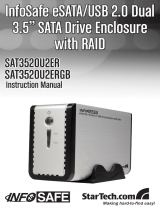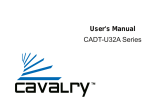
1716
Step 7. Select the setting that you prefer under "Storage Policy", then press
"Apply." NOTE: Changing the settings will erase any data on the unit.
Step 8. Your unit will take a few moments to start rebuilding. Once it has
started, it may take several hours rebuild, depending on the setting you
choose. You can monitor the progress in the SteelVine Manager main
window. Keep the unit turned on and stationary while it rebuilds. The "HDD1"
and "HDD2" lights will be lit during the rebuilding process. When completed,
your SteelVine Manager should indicate so.
Step 9. Proceed to part III, where you partition and format your RAID system.
NOTE: If you encounter problems trying to install/use the Steelvine software,
you may need a different version of the software. There are older versions of
the software in the "Contents/STEELVINE/Extra Software/" folder. Try
installing the "older MAC.pkg" (for Mac) or the "setup" file in the "older
windows" folder (for Windows). If you still have problems, contact us at


























